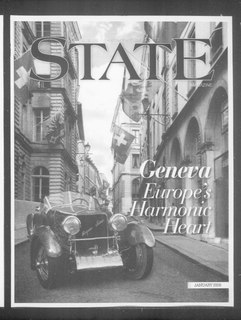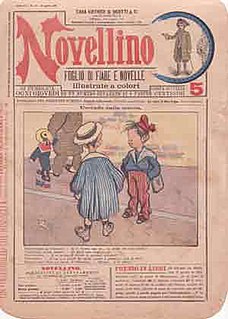Related Research Articles

Carlo Lorenzini, better known by the pen name Carlo Collodi, was an Italian author, humourist, and journalist, widely known for his fairy tale novel The Adventures of Pinocchio.

Italian is a Romance language of the Indo-European language family. Italian is the closest national language to Latin, from which it descends via vulgar Latin of the Roman Empire. Taking into account both national and regional languages, it is seen that Italian and Sardinian are together the least differentiated from Latin. Italian is an official language in Italy, Switzerland, San Marino, and Vatican City. It has an official minority status in western Istria.

A magazine is a periodical publication which is printed in gloss-coated and matte paper. Magazines are generally published on a regular schedule and contain a variety of content. They are generally financed by advertising, by a purchase price, by prepaid subscriptions, or by a combination of the three.

Giovannino Oliviero Giuseppe Guareschi was an Italian journalist, cartoonist and humorist whose best known creation is the priest Don Camillo.

Livorno is a port city on the Ligurian Sea on the western coast of Tuscany, Italy. It is the capital of the Province of Livorno, having a population of 158,493 residents in December 2017. It is traditionally known in English as Leghorn.

Sassarese is an Italo-Dalmatian language and transitional variety between Sardinian and Corsican. It is regarded as a Corso–Sardinian language because of Sassari's historic ties with Tuscany and geographical proximity to Corsica. Despite the robust Sardinian influences, it still keeps its Corsican roots, which closely relate it to Gallurese; the latter is linguistically considered a Corsican dialect despite its geographical location, although this claim is a matter of controversy. It has several similarities to Italian and in particular the old Italian dialects from Tuscany.

Federico Maria Sardelli is an Italian conductor, historicist, composer, musicologist, comic artist, and flautist. He founded the medieval ensemble Modo Antiquo in 1984. In 1987, Modo Antiquo also became a baroque orchestra, debuting with the performance of Jean-Baptiste Lully's Ballet des Saisons in front of an audience of about five thousand.

Italian comics also known as fumetto[fuˈmetto], plural form fumetti[fuˈmetti]. The most popular Italian comics have been translated into many languages. The term fumetto refers to the distinctive word balloons that contain the dialog in comics.
Regional Italian is any regional variety of the Italian language.

O, The Oprah Magazine, sometimes simply abbreviated to O, is an American monthly magazine founded by Oprah Winfrey and Hearst Communications and primarily marketed at women.

Tuscan is a set of Italo-Dalmatian varieties of Romance mainly spoken in Tuscany, Italy.

The languages of Italy are Italian, which serves as the country's national language, as well as numerous local and regional languages, most of which, like Italian, belong to the broader Romance group. The majority of languages often labeled regional are distributed in a continuum across the regions' administrative boundaries, with speakers from one locale within a single region being typically aware of the features distinguishing their own variety from one of the other places nearby.
Bonvi, pen name of Franco Bonvicini was an Italian comic book artist, creator of the comic strips Sturmtruppen and Nick Carter.
Franco Lucentini was an Italian writer, journalist, translator and editor of anthologies.

Carlo Fruttero was an Italian writer, journalist, translator and editor of anthologies.

Salentino is a dialect of the Sicilian language spoken in the Salento peninsula, which is the southern part of the region of Apulia at the southern "heel" of the Italian peninsula.

Renato Pozzetto is an Italian actor, director, comedian, and singer.

Tuscany is a region in central Italy with an area of about 23,000 square kilometres and a population of about 3.8 million inhabitants. The regional capital is Florence (Firenze).
Fabio Campana was an Italian composer, opera director, conductor, and singing teacher who composed eight operas which premiered between 1838 and 1869. He was born in Livorno, the city where his first two operas premiered, but in the early 1850s he settled in London. There he opened a famous singing school, conducted concerts, and continued his reputation as a prolific and popular composer of art songs and concert arias. His last opera, Esmeralda, premiered in Saint Petersburg in 1869, followed by London performances in 1870 with Adelina Patti in the title role. Campana died in London at the age of 63. Although his operas are no longer performed, his art songs can be heard on several modern recordings.
Blow Up is an Italian monthly music magazine, focusing primarily on alternative and obscure music. It specializes in the coverage of house music, electronica, experimental music, industrial music, queercore, techno, and jazz improvisation. Besides articles related to music, the magazine also contains sections devoted to literature and film analysis. The editor of the magazine is Stefano Isidoro Bianchi, who is also the founder. The section on literature is curated by Fabio Donalisio and the film section by Roberto Curti.
References
- 1 2 3 "COS'È IL VERNACOLIERE". Mario Cardinali.
- ↑ Alberto Abruzzese; Valerio Castronovo; Nicola Tranfaglia (1994). La stampa italiana nell'età della TV: 1975-1994. Editori Laterza. p. 426. ISBN 978-88-420-4509-0 . Retrieved 6 March 2011.
- ↑ Camillo Langone (2001). Cari Italiani, vi invidio. Fazi Editore. p. 105. ISBN 978-88-8112-173-1 . Retrieved 6 March 2011.
La satira in Italia è ormai solo provinciale (vedi il Vernacoliere). Deve essere un problema di lingua. Quello che si puo' dire in dialetto non si puo' dire in Italiano.